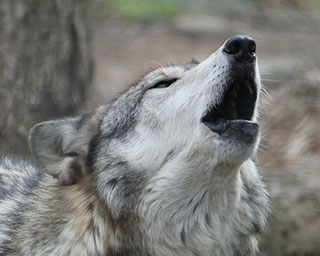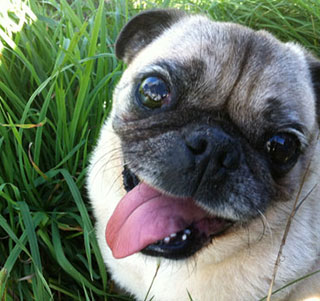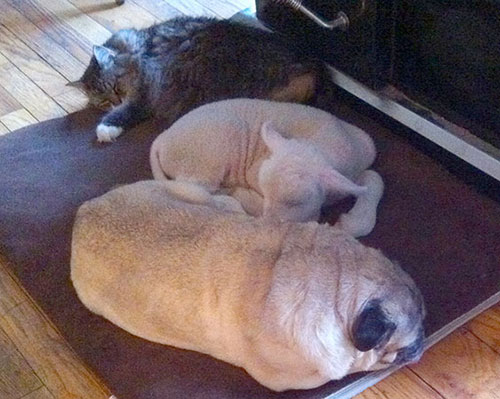Who’s the most different from you and me?

Howling wolf. Photo: Via Creative Commons, some rights reserved
Them. Those other people. And, sometimes, friend, I gotta say, I wonder about you when you (fill in the blank here).
This week, NCPR is honored to host Keith Woods, NPR’s VP for Diversity, during his two day visit to Canton. In preparation for the variety of events and activities he’ll be participating in (scroll to bottom of this post for details about what’s open to the public), I’ve been thinking about diversity and difference.
What better setting than an Amish barn-raising I was invited to earlier this week? In many ways, the Amish are the most different from the rest of us (we’re all the “English” to them) than any other cultural, religious, or racial group in the region. Your skin color may be different than mine, you may have grown up on a farm and I grew up in the city, or you may be agnostic and I’m a devout church-goer, but we all live in the same world of politics and government, media and entertainment, education and culture. Regardless of your political affiliation or favorite tv shows, regardless of the college you attended (or didn’t attend), collectively–including our differences–we create a common world or society called the United States.
Now, think about the Amish. Aside from local school and town levies, they pay no taxes; they do not vote in general elections; they send their children to one-room schools through 8th grade and no further; they build no churches, but their lives are unequivocally grounded in their Christian faith; they don’t drive cars (!); and, in a time when we “English” have abandoned small family farming and moved en masse to cities and suburbs, the Amish believe that a life on the land is inseparable from their Christianity.
Plus, they speak a dialect of German in their homes and among themselves, and English to the “English.”
So how do we even talk to each other?
Here’s the amazing thing. Over the years, with many Amish neighbors and friends, the differences seem less and less important in terms of knowing each other and caring about each other and working with each other. Don’t get me wrong, there are big differences. But, the proximity of our homes and the fact that we operate small farms gave us common ground. We use tools that most large farmers–not to mention non-farmers–don’t even recognize. (A teenage neighbor who helps out his grandfather on a very large dairy, gave us a hand haying. He was truly flabbergasted at how much time and work it took to put up hay in small square bales, compared to using combines and round-balers. My Amish friend Abe was helping me and we had a good laugh–both of us have also brought hay in loose, so square-baling seems kind of modern to both of us.)
We share small farming as a meeting point and a place to work cooperatively. We share a lot of similar values, too, though our Amish friends are quietly devout Christians and I’m a cultural Jew whose awe is directed toward nature and this planet, respect for the land is mutual and paramount. We all work hard at physical tasks, and respect those who use tools well.
We laugh at each other and our quirks; we share slightly off-color jokes (y’know, farmers are pretty earthy whether English or Amish); we take care of each other when we need help; and we trust each other.
Being invited to the barn-raising was a sign of friendship and trust. Here’s what it boiled down to as I see it: Abe and Lizzie knew that Mike (my “adopted” son) and I, without being told how to do so, would be comfortable ourselves and wouldn’t make uncomfortable the 150-200 Amish men and women there to help. We are not anthropologists. We were there as friends to pitch in and get the job done–me in the kitchen (mostly washing dishes and stirring stuff), and Mike on the building site (where he said he watched a lot and pounded a few nails once he got the drift of what is clearly well-established barn-raising procedure).
In the kitchen, the women spoke German almost exclusively, unless I asked something or someone was chatting directly with me. It didn’t matter. I’ve washed dishes and laid out food for big crowds. In this case, the entire house and main porch were filled with tables and benches to accommodate the midday meal (still called dinner by the Amish and other older rural people). The men washed up outside, were seated and served first, then the tables were cleared and the women ate.
Here’s another difference: the Amish still divide much of the day’s labor by gender, just as rural “English” families did a century ago. Men take on the bulk of the field and building work; women shoulder the house, garden, milking and childcare duties. This is not about sexism. This is about efficiency and lifestyle. Women know how to drive a buggy or a work team in the field, but their work is centered around the home, and taught by mother to daughter. Outside, it’s not unusual to see Abe’s oldest two sons, John and Levi, 16 and 14, go zooming by the window like any teenage boys…it’s just that they zoom by driving a team of work horses pulling a skidder or wagon.
So what’s the takeaway for me in the context of the upcoming visit from Keith Woods? I remember something Keith said to me when we were talking about how to shape the conversations he’d be leading. In spite of his title, VP for Diversity, Keith urged me to think of the challenge as one about difference. He considers this a better way to think about our complex make up as a society, a better way to find common ground and meaningful conversation.
For me, the key difference between talking about difference rather than diversity is that it levels the playing field. There’s some kind of hidden code in the word “diversity”–it’s been used for so many years, in so many ways, largely by those who have played a dominant role in our society (white, male, well-educated, affluent or simply more privileged in any specific setting). For those who have been more privileged and who have had their voices heard, even when well-meaning and wanting to extend a kind of magnanimous message to those who are “the diverse peoples,” the language shapes our thinking: the dominant group is not part of the meaning of “diverse.” And that perpetuates a kind of imbalance, and wariness between different peoples.
So the barn-raising was a pretty clear place for me to begin my thinking about Keith’s upcoming visit. I was alert to the differences between my world and the Amish world but it wasn’t about them including me or me including them. It was about working across, through and with our differences.
This is not a cutesy or romantic thing to do. It builds community, it makes us all better, in all directions.
Here’s hoping you’ll join the conversations with Keith Woods. There’s the Great Conversation dinner event on Wednesday, at 6 pm at Eben Holden on the SLU campus in Canton. Here’s a link to more info about the evening and how to secure a spot at the table. (By the way, Keith suggested we call this Good Conversation, bring it down a peg. Not a bad idea.)
If you can’t make the evening dinner, plan to tune in f1om 11-noon on Thursday for an on air conversation with Keith, who will be taking your questions via phone and online.
Until then, how about your thinking on this: what are the differences between the people of the north country that strengthen or challenge our region?
Tags: Amish, differences, diversity, Keith Woods










I don’t know, Ellen, but I can connect with the Amish in their distrust of the English. After all, they did go to war against us twice and they got us drawn into two World Wars.
Differences? I look at it this way. No one is me except for me. Therefore everyone is different from me. We are all just people, human animals, who share more in common with each other including being one of a kind but unequally ourselves.